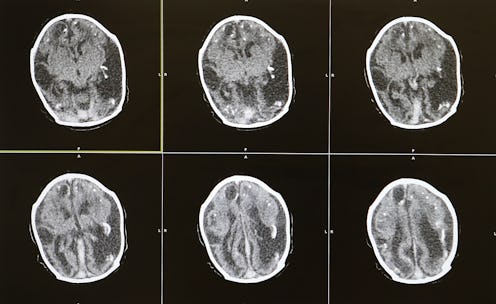Life
The One Thing That Could Help Break Your Bad Habits, According To Science

Do you have a pesky nail biting problem? Or maybe you want stop eating late at night, but you never can figure out how to successfully quit? Everyone has bad habits, whether stress-induced or driven by compulsion. Scientists have been researching the all about how people develop good habits — and how they can kick not-so-good ones. A new study suggests the key to breaking your bad habits may lie in one powerful cell in your brain, and it could have huge implications for how we understand and treat addiction, too.
The new research was a collective effort conducted by Nicole Calakos, an associate professor of neurobiology and neurology, and Henry Yin, an associate professor of neuroscience and psychology at Duke University. The scientists used mice to study the striatum, a section of the brain whose primary role is to enable voluntary movement. In the experiment, healthy mice were trained to receive a treat after pushing a lever. Once they developed a habit of pushing the lever to receive treats, the scientists then began to feed the mice treats beforehand, without requiring the mice to push the lever. Despite the change and regular access to treats, many of the mice continued to push the lever.
Scientists believe this compulsive behavior can be traced back to one cell: the fast spiking interneuron (FSI for short). According to the study, the striatum “contains two sets of neural pathways: a ‘go’ pathway, which incites an action, and a ‘stop’ pathway, which inhibits action.” Scientists found mice driven by compulsive and obsessive behavior, such as pushing the lever, exhibited much higher levels of activity from FSIs. Though FSIs make up only 1 percent of the cells in the striatum, they extremely powerful. FSI cells look like jellyfish tendrils, and though rare, they connect to at least 95 percent of the start and stop pathways the study researched.
Scientists involved in the study are calling this newfound cell the “master controller” of habits, whether it’s a "good" habit like locking your front door, or a "bad" habit like biting your nails. Interestingly, when graduate student and research participant Justin O’Hare gave the mice medicine to inhibit the firing FSIs, he found their brain activity reflected their pre-habit appearance. Put simply, the healthy mice went right back to not having any ingrained habits at all, and their lever-pulling habit disappeared when the FSI cells were blocked. How cool would it be if scientists developed a similar medication for people?
Upon publishing their research in eLife, Calakos said “Some harmful behaviors like compulsion and addiction in humans might involve corruption of the normally adaptive habit-learning mechanisms ... Understanding the neurological mechanisms underlying our habits may inspire new ways to treat these conditions." This finding provides valuable insight into the inner mechanisms of the brain, and may lead to a breakthrough in how addiction can be treated in humans. Mental health professionals find that current substance use treatment options have low success rates and high rates of relapse. Any and every new discovery on brain function is a significant step towards reducing deaths caused by addiction or other problematic habits that can prove very difficult to simply "turn off."
Plenty of psychologists have suggested scientifically-backed ways to break your bad habits and lifestyle changes to reduce stress that can cause those compulsive behaviors. However, the Duke University study expands on these practices and suggestions, offering a deeper understanding into the brain and how or why it functions. Hopefully, with continued studies of FSIs, scientists can learn how to optimize their research and offer even more insight on why it's difficult to break bad habits.